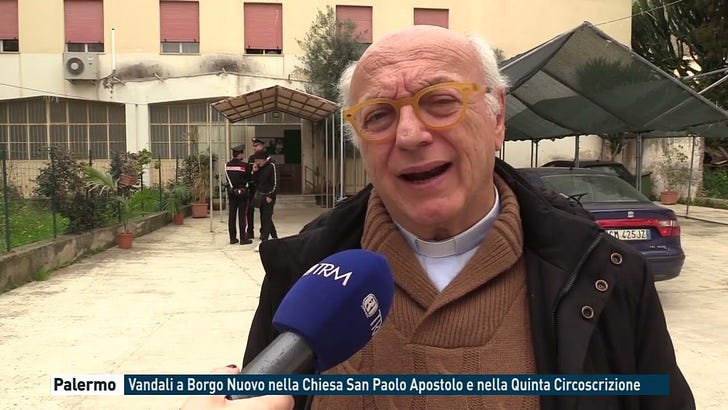Some good news for one of Palermo’s hardworking parish clergy, Father Garau, of Saint Paul the Apostle, in Borgo Nuovo, on the very furthest outskirts of the city. And a rare success for the police. The good father is interviewed above, where he laments the desecration of his church, which follows various crimes committed against schools. It seems, according to the report (all in Italian) that this is the work of crack addicts. Here is the story, translated for your convenience.
“The sacred objects stolen from the church of Saint Paul the Apostle in Borgo Nuovo, Palermo, have been found. The police, after an incessant and intense investigation, have found the furnishings stolen during a night raid.
The police operation served to heal, at least in part, the wound and the indignation caused which, due to the manner and extent of the theft, had extended well beyond the boundaries of the parish community. A few days earlier, some thieves had entered the sacristy, had ransacked it and had stolen chalices and ciboria containing the consecrated hosts, effectively jeopardizing the possibility of celebrating the Eucharist in the parish, traditionally attended by numerous faithful.
Since then, the State Police have worked tirelessly to recover the stolen goods and identify those responsible for the heinous crime. The police officers of the Anti-Robbery section of the Flying Squad combed the neighbourhood inch by inch, pursuing every lead, including that of possible receivers of the sacred furnishings.
This intuition proved to be a winning one: the sacred furnishings were found in the possession of a second-hand trader in the neighbourhood. They were inside a bag, chalices and pyxes had been dismantled and broken down into a significant number of metal components.
The second-hand dealer, who said he had purchased them without knowing they were the proceeds of theft, was reported for receiving stolen goods. Investigations are underway to verify the man's statements and to trace the perpetrators of the theft.
Chalices and ciboria were returned to Father Garau, parish priest of the Parish of St. Paul the Apostle, who wanted to express his gratitude to the police officers who returned the sacred objects to the worship of the faithful of an entire community, wounded in its soul, in the recent period, by gestures contrary to every principle of legality and civic sense.”
Once more, please note the baroque style of Italian journalism, and savour those phrases. It covers up the fact that the police really did not have to do very much, just call in at the local fence. It’s not rocket science.
But things in general in Borgo Nuovo are not great. Here’ another report:
“Vandalism raid in the newly opened Borgo Nuovo sports centre. The thieves took away the taps. The sinks were damaged. The place was flooded and made unusable. The alarm system was damaged. The gym where judo and karate were practiced was supposed to become a meeting point for the neighbourhood kids. The thieves entered through a window and took everything they found, the rest was trashed.”
In Italy great faith is placed in social projects in poor areas, and this sports centre was one of them. Sad, therefore, that thieves wrecked it more or less as soon as it was built. Pity the poor inhabitants of Borgo Nuovo!
This little video, in Italian, is worth watching, even if it has no subtitles, as it shows one the sad air of neglect. ‘Terra di nessuno’, No Man’s Land, as one resident describes it. The solution, he says, is a change in culture; not, please note, more government spending.
Borgo Nuovo is famous for being the birthplace of Mario Balotelli, a famous footballer. People in Borgo Nuovo are justly proud of him. He left there when he was very young, but still…. His story is a touching one, and though Borgo Nuovo is a sad place, the account of Balotelli’s childhood reminds you why Italy is one of the best places in the world.
“Balotelli was born Mario Barwuah in Palermo, Sicily, to Ghanaian immigrants. The family moved to Bagnolo Mella in the province of Brescia, Lombardy, when he was two. In 1993, when he was three, he was placed in foster care to the Balotelli family when his own family was unable to pay for his health care needs. His foster parents are Silvia, the Jewish daughter of Holocaust survivors, and Francesco Balotelli. They lived in the town of Concesio, Brescia, in northern Italy.
At first, he stayed with the Balotelli family during the weekdays and returned to his biological parents on weekends. He later was permanently fostered by the Balotellis full-time and adopted their surname. In June 2012, he dedicated his goals that put Italy in the final of the Euro 2012 football championships to his foster mother Silvia.Balotelli had to wait until his 18th birthday to request Italian citizenship, as his foster family had not adopted him. He officially gained citizenship in Concesio on 13 August 2008. After the ceremony he released the following statement: ‘I am Italian, I feel Italian, I will forever play with the Italian national team.’”
Is it any surprise that Italians are football mad? Will other youngsters from Borgo Nuovo have the same chances as Balotelli did? They and we can only dream.




That's a sad situation.